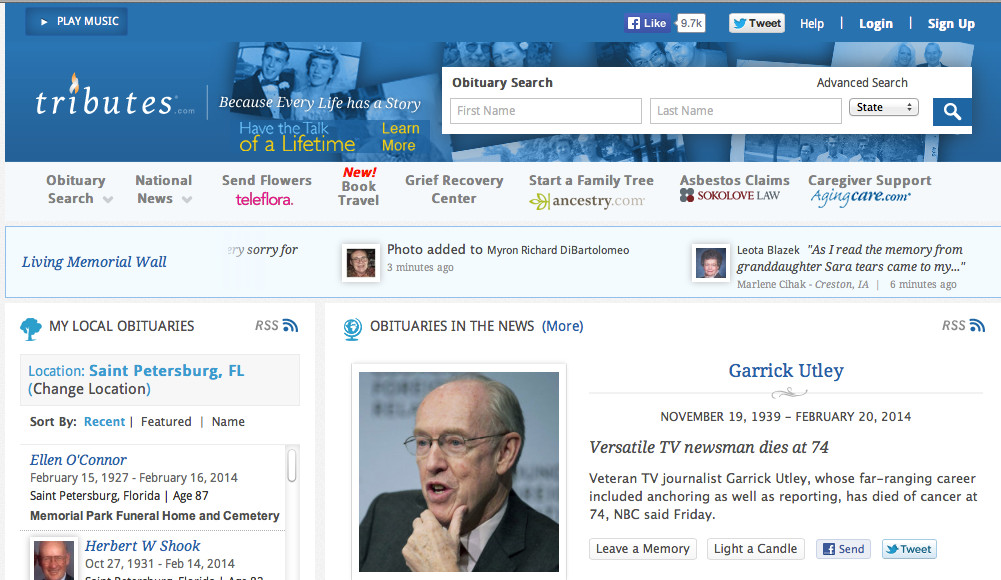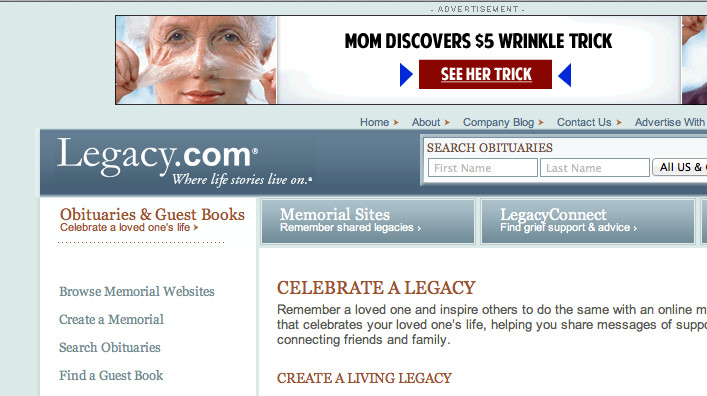Memoriams increases obituary revenues by 30%
Allowing funeral homes to place orders directly and networking markets scores a home run
As e-commerce advances, adding order-taking to classifieds and other niches is a smart move. Newspapers are turning travel sections into online booking engines, and selling background checks to landlords via third party platforms.
One LMI editor's pick in this category is Memoriams from Adpay, which provides a better way to increase obits revenues by around 29 to 30% and grow the franchise.
Simply put, Memoriams provides a front end order taking platform for newspapers to sell obituaries seamlessly through funeral homes.
About 100 newspapers are "preferred partners" who provide the service to local funeral directors, effectively turning them into an extra obits sales force. These newspapers can also use the platform internally as a workflow tool for telemarketers working with families placing ads locally and across the network.
advertisement
So far the network has obtained pricing and packaging information from 2300+ newspapers, who passively receive orders even if they are preferred partners actively promoting the platform to funeral homes in their own market.
In part, Memoriams is the newspaper industry's answer to Tributes, a company which partners almost exclusively with broadcast sites to allow funeral homes to directly upsell obits to its online platform, effectively by-passing print obituaries entirely. Consumers like the extra features and lower costs and funeral directors like the ease of use and upsell capabilities.
Legacy.com, the primary distributor of online obits for newspapers, caught up with Tributes in most areas, providing popular online upsells such as guest books and Next Generation packages to families via its newspaper partners.
But Legacy receives the data directly from newspapers, not funeral directors. So while some papers have their own front end tool to aid funeral directors placing ads, most do not and funeral homes are left faxing, calling and pricing if they want to provide this service.
Research also shows that about 30% of obituary consumers request additional placements in out-of-state newspapers, a process that is even more painfully time-consuming.
"(Funeral directors) have to look up phone numbers, write another obit, get another rate, and get the customer to approve it," according to Deb Dreyfuss-Tuchman, EVP of Sales at Adpay.
Unlike Tributes or Legacy.com, Memoriams is simply an order taking system. The platform allows funeral directors to place obits directly in print and digital locally and across the network, plus place orders for enhancements such as multiple images, emblems, additional text, digital spotlights and guestbooks.
The site does not compete with guest books or other upsells, but integrates them to help place the order more efficiently.
Once taken, orders are automatically emailed to the family, providing an extra layer of accuracy.
Here's how it works, followed by metrics and why we like this opportunity:
First, a funeral director sits with the consumer, opens the Memoriams platform, and helps the customer write the obituary, select enhancement options and additional markets:
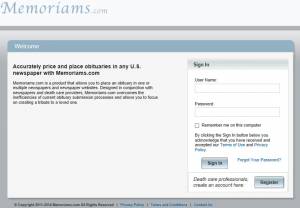
For example, the base price of an obituary in the Augusta Chonicle is about $66. However, as additional words, photos and icons are selected, the price automatically recalculates.
The selectable gallery can include whatever products the media sells, such as a flag icon for veterans, memorial plaques, extra copies of the paper or upsells to Legacy.com or the newspaper's own display ads.
"It turns the funeral directors in to sales people for the newspaper industry" Dreyfuss-Tuchman said.
After placing the first obituary, the funeral director then has the option to add more newspapers:
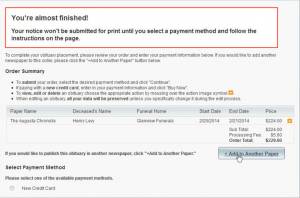
The funeral director can prompt the family with questions such as "Where did (the deceased) grow up?" or simply 'Would you like another market?" If there was, for example, a vacation home in Aspen, the director can look up newspapers in Colorado and select The Aspen Times. This copies the obit data into a second, correctly rated, obituary in the new market.
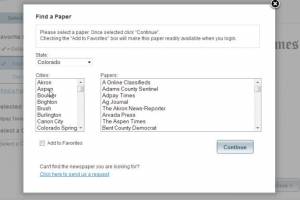
The second obit will be charged at the rates created by the Aspen Times which are already in the system:
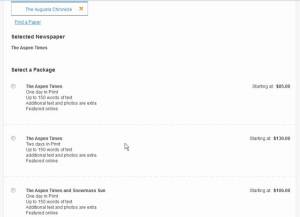
Finally, any unique additional products such as memorial plaques or Legacy.com upsells can be added to each order.
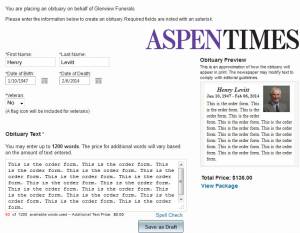
In the final payment screen all publications are paid for via a single invoice or credit card, and any part of the order can be edited.
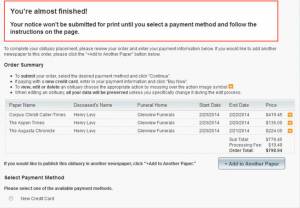
So is it working? So far the program is popular with funeral directors because of the ease of use and accuracy.
"They do it because they believe helping families with obits is a very important service," Dreyfuss-Tuchman said.
Out-of-market sales are also popular. "We have newspapers as small as Leesburg Today, where we are seeing additional market buys into the Washington Post through the fluid nature of the tool."
So what are the metrics? The business model is a "service fee like TicketMaster," ie a flat fee that varies from $15 to $20 on the total transaction in each market, "paid by the customer" rather than the newspaper or funeral director. It is shown on the final pricing summary, as a "Processing fee".
Additionally, Adpay claims that the ease of adding markets is resulting in an average of 2 obits per order, "doubling the number of obits going to the newspaper and growing print obits as a whole."
LMI has confirmed that newspapers selling Memoriams see about a 30% net increase from paid obits within about four months, especially if they were relying on fax and email to collect icons, photos, etc. AdPay confirms each market's gain by taking a baseline of per obit net pricing prior to implementing the system, and checking against post-implementation results.
Addiitionally the system decreases errors and makes good at a time when families are especially emotional. "It's a really important category to make sure you get the information right," Dreyfuss-Tuchman noted.
A good sign for the new platform is that the Dallas Morning News is about to launch the system. They have created a direct integration into their Mactive front end system, so that "no human has to touch the system... there is no rekeying. It is completely automated, so there is an internal saving as well."
Our take:
This partnership is in the no-brainer category for newspapers who carry obits. Partnering with Memoriams removes the last advantage that Tributes, as the industry disruptor, may have had and helps build the obits franchise for newspapers long term. The transaction fees need to be paid by someone, so the increased price has to be factored in if there is an issue of price resistance. However, it appears that this category is less price resistant, validated by the revenue gains of 30%. The average obit costs about $130, depending on the size of the market, so this is a largely seamless way to gain an average of $39 more per sale and reduce errors. Finally, the funeral directors only need to be set up once, and the enhanced relationship can generate more opportunities for print companies.

The author, Alisa Cromer is publisher of a variety of online media, including LocalMediaInsider and MediaExecsTech, developed while on a fellowship with the Reynolds Journalism Institute and which has evolved into a leading marketing company for media technology start-ups. In 2017 she founded Worldstir.com, an online magazine, to showcases perspectives from around the world on new topic each month, translated from and to the top five languages in the world.


